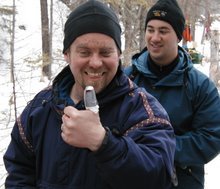There is a large sorority of popular singers who sound like they're suffering from bad allergies: Those sexy gals with low, raspy voices who yawn into the microphone and sound pinched when they sing a rare high note.

I'm talking about Norah Jones, Adele, Dido, Corinne Bailey Rae, Colbie Caillat, Sade, and the dear departed Amy Winehouse. It's thrilling to hear a singer performing the vocal equivalent of walking a tightrope -- will she hit that note or will she fall off? However, I spend a lot of my professional time trying to keep young singers from dwelling too long in this style. It's not healthy.
Adele, the 21-year old British chanteuse who sounds like Dusty Springfield's illegitimate daughter, recently canceled her U.S. tour due to a vocal hemhorrhage. In fact, this was her second major vocal crisis in a year. Adele's grainy, uneven vocal tone, exacerbated by smoking and the demands of touring, is not sustainable. I gather they've told her to go to vocal rehab and thankfully she has not said "no, no, no."
I have to admit I'm drawn to song of hers. Rolling In the Deep is an almost-great song and fun to hear. However, the lyrics, co-written by Adele and Paul Ellworth, don't match the strong melody and performance. Every time I hear this song I think, "Almost!" I like the chorus the best -- a great match of words and music: You had my heart inside your hands/and you played it to the beat. Until I read the lyrics I thought she was singing You had my heart and soul in your hands, and I like that image and soul rhymes slightly better with the beginning of the chorus, We could have had it all -- even if technically having two items in a jerk's hands (one's heart and soul) would therefore demand changing played it to played them to the beat. I know . . . nitpicking.
Verse One: Reaching a fever pitch and it's bringing me out the dark -- did they forget the "of" as in "out of the dark," or was that intentional? Or does she mean she's bringing out the darkness of her mood? I can't figure it out. And why did she repeat these opening lyrics at the end of the first verse? She didn't do it on any other verses. Finally I can see you crystal clear/Go ahead and sell me out and I'll lay your sh-t bare. Sell out? What the heck happened, Adele? I'm confused! And, why use a scatological word in the first verse? To a 21 year old it might not be a swear word, but really, girl, once you go blue here's nowhere left to go, just ask Cee-Lo Green. And can we rhyme clear with something else? How about extending the whole fire metaphor: Smoke and cinders fill my eyes with tears /Burn up the past but it won't help me forget the years. I know, it's not great -- but neither is yours.
Bridge to the Chorus: The scars of your love remind me of us . . . they leave me breathless. Wow, those must be some scars if they interfere with your ability to breathe. Diagnosis: Love Pneumonia.
Musically, I am puzzled by Adele's "rolling in the deep" on the highest notes in her head voice range. She sings "deep" on the C above middle C. It's an odd juxtaposition of that good melody and that good lyric. Maybe only picky voice teachers find it odd.
Verse two: Baby, I have no story to be told/but I've heard the one on you and I'm gonna make your head burn. I understand she's trying to connect the fire images from verse one and also keep the tone angry, but it's a weak link. Told and burn do not rhyme. Eminem manages to rhyme when he's ticked off, why not you, Adele?

What about Baby, I have no story to be told, but I've read the book on you and now your head will roll. What's wrong with that? Makes me think of Henry VIII! Or, I heard it all from her, it's seared into my soul. Why not confirm that there was another woman? That would be justifiable, rhyming anger.
Verse three: Throw your soul through every open door. Who's doing the throwing, Adele or the jerk? Each scenario is plausible. But, the whole stanza is a jarring mix of images: Soul-throwing, then counting blessings, then sorrows becoming golden, then reaping what you sow (my favorite of the four). All of the lines end in half-rhymes or oblique rhymes.
For those seeking an advanced degree in Adele Lyrical Studies: Please figure out whether these rhyme schemes were intentional. As for me, I'll continue to enjoy deconstructing and rewriting Rolling In The Deep every time I hear it. Adele, during your vocal rest I know you'll be writing songs. Just be sure to have a thesaurus and a rhyming dictionary next to your Throat Coat tea. Or, call me up! ;)
Can't wait to hear what you do next.
























